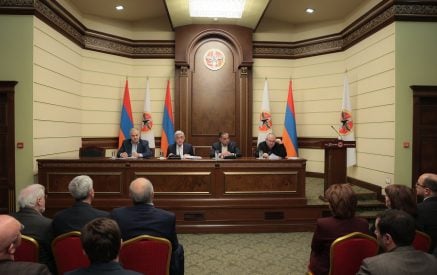The significance of the theme on Constitutional amendments, in my opinion, is somewhat exaggerated. In the political circles and on the Internet, people are swaying propaganda swords over each other, however, in everyday life, the concerns of ordinary people are far from this subject. The majority is dissatisfied with their situation and wish “kind authorities” to come who would take them out from this situation, would give high salaries and return their relatives being in the foreign land. One more important factor: they do not see the political figures available in the arena in the role of “kind authorities”, and after listing numerous complaints, they as a question, “And if this one comes, would it be better?”
In the background, a pretty abstract debate is underway about whom the present or the future Constitution gives the chance to sit in this or that chair, or whose political monopoly will be maintained through the text written on the paper. The debate is abstract for the very simple reason that the events in Armenia are developed, to put it mildly, not as it is written in a text. Until the autumn of 1997, no one would doubt on the PANM party’s political monopoly. But it vanished and was substituted by other monopolies not because the Constitution enabled this opportunity, but because the then Prime Minister, the Defense Minister and the Minister of Interior Affairs and National Security decided to dismiss the president. The Constitution was overly presidential (some were even saying, “tyrannical”), it fully enabled the president to dismiss those who rise against him. But paper is one thing, reality quite another thing. The reality was that the president could not get rid of these officials if not for the extreme escalation of the situation.
After the May 1999 parliamentary elections, when the “Unity” alliance entered the Parliament with overwhelming majority, and the PAP – People’s Party of Armenia tandem obtained a political monopoly, the Constitution was also strongly presidential, the president was endowed with numerous powers, which, however, could not implement and appeared in the role of an “observer”. No such thing was written on the paper, but the real relationship of forces compelled the president to become a “Queen of England”. This management crisis was resolved by the “October 27” terror, and a few months later, approximately from May 2000, the Republican Party’s political monopoly was established, even though this was not written in the Constitution and also envisaged by the 2005 amendments. The ruling nomenclature party’s political monopoly (no matter how this party will be called: PANM, RPA or the “First Armenian Braves”) will be maintained in the case of the current and future Constitutions, and even if in the case if there is no Constitution. In the event when the minister’s driver may solve more problems than the deputy minister, it becomes useless to argue about the words written on the paper.
… By the Constitution of the Netherlands, the Prime Minister, ministers and mayors are appointed by the king (queen). It seems like it is not a tyranny.
Read also
Aram ABRAHAMYAN






















































